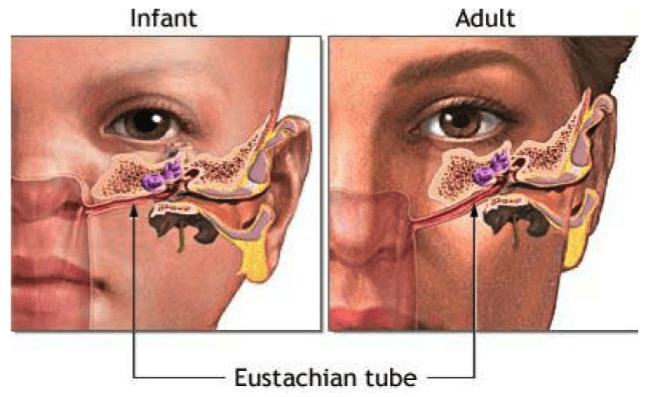Contents:
- Medical Video: NICCU (NICU) Baby Born 10-Weeks Early Grows Stronger - Live L.A., Give L.A.
- Development of babies aged 10 weeks
- How is the baby developing 10 weeks?
- What should I do with my baby?
- Health for babies aged 10 weeks
- What do I need to discuss with the doctor in a 10-week-old baby?
- Which must be considered
Medical Video: NICCU (NICU) Baby Born 10-Weeks Early Grows Stronger - Live L.A., Give L.A.
Development of babies aged 10 weeks
The development of a 10-week baby is quite diverse, as a parent you might be curious about what your little one can do at that age.
How is the baby developing 10 weeks?
Most 10-week-old babies often wake up in the middle of the night to suckle. At this age, babies usually have a longer sleep and wake interval. This will give you plenty of opportunities to rest or just take a nap to save energy.
Things that happen in the development of a 10-week baby, such as:
- Make various sounds
- Able to lift your head to 45 degrees while lying down
- Like to kick his legs and wave his hand to reach for the objects on it
- Open and close the hand
- Inserting his hand into his mouth to suck
What should I do with my baby?
To support the development of a 10-month baby, you can try the methods below:
- Invite to talk anytime and anywhere. Even though your baby doesn't know what you are saying, this can help train them to recognize their parents' voices.
- Give the baby a chance to respond. Babies who are often invited to communicate with parents will learn to speak faster. Respond to every babble of your baby by giving an enthusiastic facial expression.
- Play with a tone of voice when speaking.
- Sing songs for babies.
- Read a story for him.
- Look at the signal from the baby when he gets tired of listening to your voice, for example, often close your eyes, turn your eyes, cry, or get angry easily.
- Give toys to train the reach of his hands.
Health for babies aged 10 weeks
What do I need to discuss with the doctor in a 10-week-old baby?
Some things you can discuss with your doctor regarding the development of a 10-week baby include:
- Ask your doctor what activities you can and cannot do, your eating and sleeping patterns, and the development and care of your baby if you intend to go back to work
- Ask your doctor if you are worried about your child's condition if you decide to go back to work.
What should I know when treating a 10-month-old baby?
So that the baby's development of 10 weeks is more optimal, there are a number of things parents must know when caring for them, namely:
1. Reflux in infants
Reflux occurs when food and stomach acid move from the stomach to the esophagus (esophagus). Most babies may experience spit up, aka spouting milk or vomiting after breastfeeding. This is actually reasonable and tends to be harmless.
However, you should immediately take your baby to the doctor if you show symptoms such as:
- Looks in pain
- Do not want to suckle
- His weight did not rise
- The milk released changes color to greenish, yellowish, or brownish like blood
- Choking and coughing
- Shortness or difficulty breathing
These symptoms usually indicate abnormal conditions. Because this can be a sign your child is experiencing gastroesophageal reflux disease (GERD) or also often called gastric acid reflux.
Some studies suggest adding rice cereal to breast milk or formula to make milk thicker so that reflux symptoms improve.
You can also raise the baby during and after meals, with their heads lifted around 30 degrees to prevent reflux. Even if the baby is constantly belching, this method can also help relieve symptoms of reflux.
Your doctor may prescribe medications that help reduce acid in the stomach or acid blockers for your baby to drink every day. This medicine is similar to ulcer medicine for adults. Remember, you may not give any baby medicines without the doctor's consent.
2. Roll over and turn around
At the age of 10 weeks, they are usually able to lie down from one side to the other and vice versa. When a child becomes more active, it means you have to use one hand to hold the baby when changing diapers.
You should not let the baby lie on the bed or any place that is too high and far from the floor or ground without watching over the baby because now he can move and fall easily.
Which must be considered
What do you need to watch out for at 10 weeks of age?
Some things you should pay attention to in 10-week-old babies include:
Salivate
The baby's salivary glands begin to function since the baby is still in the womb. However, at the stage of development of a 10-week baby, generally saliva production increases.
This makes the baby often salivate. At this age the baby tends to put any object into the mouth so that the amount of saliva that comes out will be more than the saliva that he swallowed.
Even so, you need to know that drooling does not mean your baby is in the process of growing teeth.
Most baby's first teeth grow at the age of 4-7 months. If the child develops early, one of the 2 lower teeth will grow when the child is 3 months old.
Snoring
At first, the sound of snoring in infants can appear at any time. But over time, you will realize that these sounds appear every time you talk to your baby after he is full, when he sees himself in front of a mirror, or even sees a duck toy that is hung on a rocking bed.
In the development stage of this 10-week baby, the child will also use his throat, tongue and mouth to try to make a sound.
For parents, snoring is the baby's first voice made after crying. In a few weeks to several months, your baby will start laughing out loud (usually around three and a half months), or screaming (when he is four and a half months old) and making other sounds.
Your child may spell consonants at very different stages. Some babies can spell consonants when they are three and a half months old, others have to wait until they are 5-6 months old.
When babies start trying to spell consonants, they generally emit sounds simultaneously from 1-2 consonants and repeat them repeatedly.












